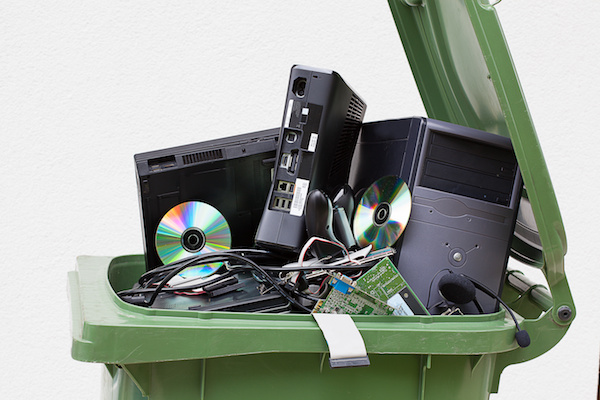
As worries increase that the UK might fall short of recycling targets for WEEE (waste electrical and electronic equipment), treatment plant operators are proposing that the main reason for the shortfall is the way WEEE is classified by regulators. They suggest that the 2017 recycling rates are below what was expected because of differences in how regulators are defining and recording waste equipment and due to illegal exports.
WEEE is a European law that all businesses and government bodies have to follow. This law was formed to stop electronic waste being dumped into landfill (you can read more about WEEE here).
Some producer compliance schemes have maintained that the decrease in the number of new products being bought (and hence less old products going as WEEE) is the reason for the lower rates of recycling. This could lead to softening of targets but operators are maintaining that they are putting too much emphasis on links between new and old equipment and misrepresenting data. The operators are now asking for “challenging targets” in 2018 instead.
They argue that the decrease in the volume of collections is much bigger than the decrease in electrical and electronic equipment waste placed on the market, suggesting that the reduction in collection is due more to leakage from the regulated WEEE system than a reduction in the amount becoming available for recycling.
This warning from plant operators has come via the AATF Forum – a new representative forum formed by WEEE Approved Authorised Treatment Facility operators. Members account for the vast majority of UK WEEE recycling and the Forum is chaired by independent consultant, Phil Conran of 360 Environmental.
Two Main Factors in WEEE Recycling Leaks
The Forum has suggested that this ‘leakage’ is due to two main factors.
The first is the increase in unrecorded reuse. Many used appliances, particularly from collections and warranty returns from retailers, are treated for reuse without being classed as waste. Definitions of waste varies significantly throughout the UK, with some areas required to classify waste at the point of collection and others once the used waste arrives at an Approved Authorised Treatment Facility.
The second factor is illegal exports and unreported treatment. Members of the Forum have lately reported seeing an increase in enquires from questionable businesses who want to buy any usable items for export irrespective of condition. WEEE originating from car boot and online sales is also being exported illegally. They also maintain that some electrical waste may be scrapped without being recorded.
Producer compliance schemes have been set targets for recycling and can ‘buy’ evidence if these targets aren’t met, and the Department for Environment, Food & Rural Affairs (DEFRA) can also add in WEEE estimates which isn’t covered by the schemes. For instance products sent for reuse and not counted as WEEE could fall into this category (called ‘substantiated estimates’).
Defra does need to be able to validate their estimates though, so the Forum has said that steps need to be taken to reduce the difference between current levels of collection, estimated at 40%, well under the EU’s collection target of 65% for next year.
